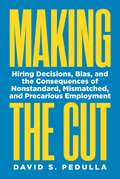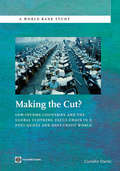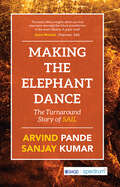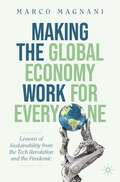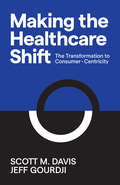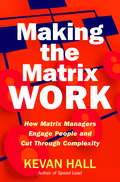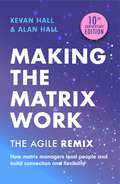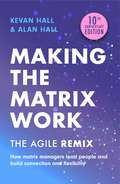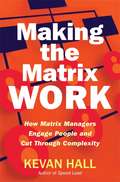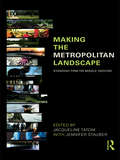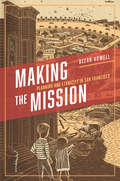- Table View
- List View
Making the Cut: Hiring Decisions, Bias, and the Consequences of Nonstandard, Mismatched, and Precarious Employment
by David PedullaAn in-depth look at how employers today perceive and evaluate job applicants with nonstandard or precarious employment historiesMillions of workers today labor in nontraditional situations involving part-time work, temporary agency employment, and skills underutilization or face the precariousness of long-term unemployment. To date, research has largely focused on how these experiences shape workers’ well-being, rather than how hiring agents perceive and treat job applicants who have moved through these positions. Shifting the focus from workers to hiring agents, Making the Cut explores how key gatekeepers—HR managers, recruiters, and talent acquisition specialists—evaluate workers with nonstandard, mismatched, or precarious employment experience. Factoring in the social groups to which workers belong—such as their race and gender—David Pedulla shows how workers get jobs, how the hiring process unfolds, who makes the cut, and who does not.Drawing on a field experiment examining hiring decisions in four occupational groups and in-depth interviews with hiring agents in the United States, Pedulla documents and unpacks three important discoveries. Hiring professionals extract distinct meanings from different types of employment experiences; the effects of nonstandard, mismatched, and precarious employment histories for workers’ job outcomes are not all the same; and the race and gender of workers intersect with their employment histories to shape which workers get called back for jobs. Indeed, hiring professionals use group-based stereotypes to weave divergent narratives or “stratified stories” about workers with similar employment experiences. The result is a complex set of inequalities in the labor market.Looking at bias and discrimination, social exclusion in the workplace, and the changing nature of work, Making the Cut probes the hiring process and offers a clearer picture of the underpinnings of getting a job in the new economy.
Making the Cut?
by Cornelia Cornelia StaritzThe clothing sector has traditionally been a gateway to export diversification and industrial development for low-income countries (LICs) due to its low fix costs, relatively simple technology, and labor-intensive nature. It has served to absorb large numbers of unskilled, and mostly female, workers and build capital and know-how for more technologically advanced activities within and across sectors. But the environment for global clothing trade has changed significantly which may condition the role the sector can play in promoting export diversification and industrial development in LICs today. Main drivers have been the rise of global buyers and their global sourcing strategies, the phase out of quotas in the Multi-Fiber Arrangement (MFA), and, more recently, the global economic crisis. In the context of these changes, this study analyzes how the clothing sector can still provide a gateway to export diversification and industrial development for LICs today. The key objectives of this study are to assess main developments in the global clothing sector associated with the Multi-Fiber Arrangement (MFA) phase out, global buyers and their sourcing strategies, and the global economic crisis; analyze challenges that LICs are facing in the post-quota and post-crisis world in entering and upgrading within global clothing value chains; and identify policy recommendations to increase the competitiveness of LIC clothing exporters as well as to further their integration into and improve their positions within global clothing value chains. For the study interviews with buyers in the US, the EU and South Africa as well as case studies in Sub-Saharan African LICs (Kenya, Lesotho and Swaziland), Cambodia and Bangladesh were conducted. The study finds that global consolidation in the clothing sector has increased entry barriers at the country and firm level. This has created new challenges to LIC suppliers as low labor costs and preferential market access are not enough to be competitive in the clothing sector today. Suppliers with broad capabilities have been able to develop strategic relationships with global buyers. Marginal or new suppliers are entering the global value chains through intermediaries, but face limited upgrading opportunities. FDI plays an important role in integrated LICs into global clothing value chains, yet it needs to be used in a way that promotes and upgrades local clothing industries. Overall, the clothing sector still provides opportunities for export diversification and industrial development. However, this requires pro-active policies to increase the competitiveness and local embeddedness of LIC clothing exporters.
Making the Deal Real: How GE Capital Integrates Acquisitions
by Ronald N. Ashkenas Lawrence J. Demonaco Suzanne C. FrancisThousands of companies every year acquire other companies, or are acquired themselves. This event is usually painful and messy--and statistics show, it is frequently unsuccessful as well. Nearly half of all mergers fail. One company that has made a fine art of the acquisition integration process, however, is GE Capital, which has integrated hundreds of companies in the past decade. Consultants Ron Ashkenas and Suzanne Francis, and Lawrence DeMonaco of GE Capital, offer four lessons from the company's successful run.
Making the Elephant Dance: The Turnaround Story of SAIL
by Sanjay Kumar Arvind PandeAt a time when businesses stare at unprecedented uncertainty, the SAIL turnaround story brings to us lessons of how companies can make miracles happen. Making the Elephant Dance talks about how the greatest business challenges can become the harbinger of the biggest corporate transformations, and how leadership can be the key influencer when companies face existential threats. The economic reforms of 1991 transformed the Indian steel industry overnight from the most controlled to most open. This book is a narrative of the steel mammoth, SAIL, which fought back an existential threat to emerge as a winner when a combination of domestic and global factors plunged the industry into its worst ever crisis. The book delineates its in-house strategies, implementation challenges and the actions undertaken to bring about an unprecedented organizational transformation by those who participated, experienced and lived it.
Making the Empire Work: Labor and United States Imperialism (Culture, Labor, History #13)
by Daniel E. Bender Jana K. LipmanMillions of laborers, from the Philippines to the Caribbean, performed the work of the United States empire. Forging a global economy connecting the tropics to the industrial center, workers harvested sugar, cleaned hotel rooms, provided sexual favors, and filled military ranks. Placing working men and women at the center of the long history of the U.S. empire, these essays offer new stories of empire that intersect with the "grand narratives" of diplomatic affairs at the national and international levels. Missile defense, Cold War showdowns, development politics, military combat, tourism, and banana economics share something in common--they all have labor histories. This collection challenges historians to consider the labor that formed, worked, confronted, and rendered the U.S. empire visible. The U.S. empire is a project of global labor mobilization, coercive management, military presence, and forced cultural encounter. Together, the essays in this volume recognize the United States as a global imperial player whose systems of labor mobilization and migration stretched from Central America to West Africa to the United States itself. Workers are also the key actors in this volume. Their stories are multi-vocal, as workers sometimes defied the U.S. empire's rhetoric of civilization, peace, and stability and at other times navigated its networks or benefited from its profits. Their experiences reveal the gulf between the American 'denial of empire' and the lived practice of management, resource exploitation, and military exigency. When historians place labor and working people at the center, empire appears as a central dynamic of U.S. history.
Making the Entrepreneurial Transition: Understanding the Challenges of Women Entre-Employees (Palgrave Studies in Equity, Diversity, Inclusion, and Indigenization in Business)
by Sydney D. RichardsonEntre-employees are those who work for an organization while running their own company, with no interest in the transition to full-time entrepreneurship. This book explores the history, challenges, and leadership development of women entre-employees. The author examines the impact of COVID as well as race and sexism in the workplace on women entre-employees. She also discusses how women are more likely to embrace community-driven businesses, which often face slow growth. Given these challenges, the author proposes ways that employers can support women entre-employees, who have been proven to be valuable workers. Using the life stories of women entre-employees, this useful addition to the entrepreneurship field will appeal to entrepreneurship scholars as well as those interested in topics related to leadership and gender at work.
Making the European Monetary Union
by Harold JamesEurope’s financial crisis cannot be blamed on the Euro, Harold James contends in this probing exploration of the whys, whens, whos, and what-ifs of European monetary union. The current crisis goes deeper, to a series of problems that were debated but not resolved at the time of the Euro’s invention. Since the 1960s, Europeans had been looking for a way to address two conundrums simultaneously: the dollar’s privileged position in the international monetary system, and Germany’s persistent current account surpluses in Europe. The Euro was created under a politically independent central bank to meet the primary goal of price stability. But while the monetary side of union was clearly conceived, other prerequisites of stability were beyond the reach of technocratic central bankers. Issues such as fiscal rules and Europe-wide banking supervision and regulation were thoroughly discussed during planning in the late 1980s and 1990s, but remained in the hands of member states. That omission proved to be a cause of crisis decades later. Here is an account that helps readers understand the European monetary crisis in depth, by tracing behind-the-scenes negotiations using an array of sources unavailable until now, notably from the European Community’s Committee of Central Bank Governors and the Delors Committee of 1988–89, which set out the plan for how Europe could reach its goal of monetary union. As this foundational study makes clear, it was the constant friction between politicians and technocrats that shaped the Euro. And, Euro or no Euro, this clash will continue into the future.
Making the Financial System Sustainable
by Paul G. FisherThe EU Action Plan on Financing Sustainable Growth is the most advanced and comprehensive policy agenda on sustainability in the world. But is it going in the right direction? Acting as a bridge between policy and academia, this up-to-date contribution to the global policy debate brings together some of the leading experts from the European Commission's High-Level Expert Group on Sustainable Finance, to discuss how the financial system needs to be reformed to promote sustainability. Finance has long been criticized for being short-term focused and concerned with maximizing returns to intermediaries, rather than with the interests of savers and borrowers. The financial system must now take into account environmental, social and governance considerations to support a sustainable economy and this volume offers new insights on the way forward. A must-read for anyone working on financial sector policy and sustainability.
Making the Global Economy Work for Everyone: Lessons of Sustainability from the Tech Revolution and the Pandemic
by Marco MagnaniThe Covid-19 pandemic has revealed the weaknesses of globalisation, exposed the fragility of the current growth model, and accelerated the ongoing tech revolution. This book is an in-depth analysis of these weaknesses and fragilities in the context of sustainability. Economist Marco Magnani suggests the possibility of pursuing a more balanced, environmentally and socially sustainable growth while defusing today’s apocalyptic alarmism about climate change, energy and demographic constraints, and the future of work. To make the global economy work for everyone.
Making the Healthcare Shift: The Transformation to Consumer-Centricity
by Scott M. Davis Jeff GourdjiMaking the Healthcare Shift is a practical guide for healthcare leaders across the globe who have the fortitude to transform their organizations to both compete and win in the age of healthcare consumerism.Healthcare organizations finally have both the motive and means to engage and empower consumers. While healthcare organizations have recognized the need to change, they often don&’t know where or how to begin. As the industry sits on the edge of transformation, marketing strategists, Scott Davis and Jeff Gourdji, reveal how traditional healthcare organizations (payers, providers, pharma companies) can prepare for the changes to come and re-invent how they engage with consumers. Making the Healthcare Shift includes over 60 executive interviews with the biggest names in healthcare and a quantitative research study. Some of these names include Mayo Clinic, Blue Cross Blue Shield plans, and Pfizer. Scott and Jeff identify five shifts organizations can make to better compete and win in this evolving landscape and offer practical advice on how to make those shifts become a reality.
Making the Invisible Visible
by Tojo Thatchenkery Keimei SugiyamaWhen we think of the most visible person in the workplace, we typically think of those who are in the most senior leadership positions; the CEO, the president of the organization. We assume that having visibility means leadership through "showing" others what it means to be a leader. Yet Tojo Thatchenkery and Keimei Sugiyama found different and more collectively focused themes for leadership. "Making the Invisible Visible" isa study of Asians and Asian Americans in the workplace and provides a framework through which to transform the same qualities that are contributing to this invisibility phenomenon into a positive leadership approach that provides a counterweight to balance the showmanship approach to leadership. Showmanship can lead to short term achievement; however, an environment full of only this kind of leadership does not provide the opportunity for long term sustainable performance. They also discuss strategies for Asians and Asian Americans for career management. The invisible leaders that are going unseen today can be the visible leaders of tomorrow. "
Making the Market: Victorian Origins of Corporate Capitalism
by Paul JohnsonCorporate capitalism was invented in nineteenth-century Britain; most of the market institutions that we take for granted today - limited companies, shares, stock markets, accountants, financial newspapers - were Victorian creations. So were the moral codes, the behavioural assumptions, the rules of thumb and the unspoken agreements that made this market structure work. This innovative study provides the first integrated analysis of the origin of these formative capitalist institutions, and reveals why they were conceived and how they were constructed. It explores the moral, economic and legal assumptions that supported this formal institutional structure, and which continue to shape the corporate economy of today. Tracing the institutional growth of the corporate economy in Victorian Britain and demonstrating that many of the perceived problems of modern capitalism - financial fraud, reckless speculation, excessive remuneration - have clear historical precedents, this is a major contribution to the economic history of modern Britain.
Making the Matrix Work
by Kevan HallGlobal customers, supply chains and more integrated business functions mean that work now cuts across the traditional vertical silos of country and function. But the 'solution' of the matrix structure also brings multiple bosses, competing goals and higher levels of complexity. Traditional management training prioritizes clarity, predictability and control. In a matrix we need to be able to balance this with the ability to tolerate ambiguity, manage uncertainty and decentralize control. Managers need an expanded toolkit to help them move from the hard to the soft, from the concrete to the ambiguous and back again depending on the situation. Kevan Hall's new book will help you develop your "matrix mindset" and will show you how to establish and engage networks that do not depend on role, control or authority to get things done. This book gives individuals working in the matrix the tools to take control of their own goals, role and success and shows matrix managers how to lead others to make their matrix really work.
Making the Matrix Work, 2nd edition: The Agile Remix
by Kevan Hall Alan HallA decade on from its first publication, the book that inspires and enables people to succeed in complex organisations is now updated for Agile working.How to work and manage others successfully in matrix organisations operating across regions and functions, with global teams, customers and supply chains. Traditional management training prioritizes clarity, predictability and control. In a matrix we need to be able to balance this with the ability to tolerate ambiguity, manage uncertainty and decentralize control. Managers need an expanded toolkit to help them move from the hard to the soft, from the concrete to the ambiguous and back again depending on the situation. Making the Matrix Work helps you develop your matrix mindset and will show you how to establish and engage networks that do not depend on role, control or authority to get things done.This 10 year anniversary edition has been extensively revised to cover Agile and digital working, for those working and managing in the fast paced new world of work, with autonomous teams, iterative working and non-hierarchical leadership. It will includes new material on alignment and connecting across silos, and on autonomous teams as well as 3 major new chapters on:Change and stabilityHierarchyNetworks There are updates to terms and techniques throughout the book to reflect hybrid and post pandemic working considerations and the impact of digital transformation.(P)2023 Hodder & Stoughton Limited
Making the Matrix Work, 2nd edition: The Agile Remix
by Kevan Hall Alan HallA decade on from its first publication, the book that inspires and enables people to succeed in complex organisations is now updated for Agile working.How to work and manage others successfully in matrix organisations operating across regions and functions, with global teams, customers and supply chains. Traditional management training prioritizes clarity, predictability and control. In a matrix we need to be able to balance this with the ability to tolerate ambiguity, manage uncertainty and decentralize control. Managers need an expanded toolkit to help them move from the hard to the soft, from the concrete to the ambiguous and back again depending on the situation. Making the Matrix Work helps you develop your matrix mindset and will show you how to establish and engage networks that do not depend on role, control or authority to get things done.This 10 year anniversary edition has been extensively revised to cover Agile and digital working, for those working and managing in the fast paced new world of work, with autonomous teams, iterative working and non-hierarchical leadership. It will includes new material on alignment and connecting across silos, and on autonomous teams as well as 3 major new chapters on:Change and stabilityHierarchyNetworks There are updates to terms and techniques throughout the book to reflect hybrid and post pandemic working considerations and the impact of digital transformation.(P)2023 Hodder & Stoughton Limited
Making the Matrix Work, 2nd edition: The Agile Remix
by Kevan Hall Alan HallHow to work and manage others successfully in matrix organisations operating across regions and functions, with global teams, customers and supply chains. Traditional management training prioritizes clarity, predictability and control. In a matrix we need to be able to balance this with the ability to tolerate ambiguity, manage uncertainty and decentralize control. Managers need an expanded toolkit to help them move from the hard to the soft, from the concrete to the ambiguous and back again depending on the situation. Making the Matrix Work helps you develop your matrix mindset and will show you how to establish and engage networks that do not depend on role, control or authority to get things done.This 10 year anniversary edition has been extensively revised to cover Agile and digital working, for those working and managing in the fast paced new world of work, with autonomous teams, iterative working and non-hierarchical leadership. It will includes new material on alignment and connecting across silos, and on autonomous teams as well as 3 major new chapters on:Change and stabilityHierarchyNetworks There are updates to terms and techniques throughout the book to reflect hybrid and post pandemic working considerations and the impact of digital transformation.
Making the Matrix Work, 2nd edition: The Agile Remix
by Kevan HallHow to work and manage others successfully in matrix organisations operating across regions and functions, with global teams, customers and supply chains. Traditional management training prioritizes clarity, predictability and control. In a matrix we need to be able to balance this with the ability to tolerate ambiguity, manage uncertainty and decentralize control. Managers need an expanded toolkit to help them move from the hard to the soft, from the concrete to the ambiguous and back again depending on the situation. Making the Matrix Work helps you develop your matrix mindset and will show you how to establish and engage networks that do not depend on role, control or authority to get things done. This 10 year anniversary edition has been extensively revised to cover Agile and digital working, for those working and managing in the fast paced new world of work, with autonomous teams, iterative working and non-hierarchical leadership. It will includes new material on alignment and connecting across silos, and on autonomous teams as well as 3 major new chapters on: Change and stability Hierarchy Networks There are updates to terms and techniques throughout the book to reflect hybrid and post pandemic working considerations and the impact of digital transformation.
Making the Matrix Work: How Matrix Managers Engage People and Cut Through Complexity
by Kevan HallGlobal customers, supply chains and more integrated business functions mean that work now cuts across the traditional vertical silos of country and function. But the 'solution' of the matrix structure also brings multiple bosses, competing goals and higher levels of complexity. Traditional management training prioritizes clarity, predictability and control. In a matrix we need to be able to balance this with the ability to tolerate ambiguity, manage uncertainty and decentralize control. Managers need an expanded toolkit to help them move from the hard to the soft, from the concrete to the ambiguous and back again depending on the situation. Making the Matrix Work introduces some new ideas and practical tools in 3 key areas. * Leading people beyond clarity to flexibility A matrix trades clarity for flexibility. We need to create enough clarity on goals and roles and to align with others; but we also need to cope with ambiguity, manage complex trade-offs and dilemmas and deal with higher levels of conflict. * Being connected and effective We set up a matrix to improve cooperation and communication across the silos but be careful what you wish for! It is easy to become over-connected to poor quality meetings, teams and communication. More teamwork, meetings and emails are not the answer. * Creating control by giving it away. The complexity and diversity of the matrix can undermine trust and lead to an increase in central control and bureaucracy. We need to prevent this by building trust, empowering and creating commitment. Accountability without control and influence without authority are the norm. Kevan Hall's new book will help you develop your matrix mindset and will show you how to establish and engage networks that do not depend on role, control or authority to get things done. This book gives individuals working in the matrix the tools to take control of their own goals, role and success and shows matrix managers how to lead others to make their matrix really work.
Making the Matrix Work: How Matrix Managers Engage People and Cut Through Complexity
by Kevan HallGlobal customers, supply chains and more integrated business functions mean that work now cuts across the traditional vertical silos of country and function. But the 'solution' of the matrix structure also brings multiple bosses, competing goals and higher levels of complexity. Traditional management training prioritizes clarity, predictability and control. In a matrix we need to be able to balance this with the ability to tolerate ambiguity, manage uncertainty and decentralize control. Managers need an expanded toolkit to help them move from the hard to the soft, from the concrete to the ambiguous and back again depending on the situation. Making the Matrix Work introduces some new ideas and practical tools in 3 key areas. * Leading people beyond clarity to flexibility A matrix trades clarity for flexibility. We need to create enough clarity on goals and roles and to align with others; but we also need to cope with ambiguity, manage complex trade-offs and dilemmas and deal with higher levels of conflict. * Being connected and effective We set up a matrix to improve cooperation and communication across the silos but be careful what you wish for! It is easy to become over-connected to poor quality meetings, teams and communication. More teamwork, meetings and emails are not the answer. * Creating control by giving it away. The complexity and diversity of the matrix can undermine trust and lead to an increase in central control and bureaucracy. We need to prevent this by building trust, empowering and creating commitment. Accountability without control and influence without authority are the norm. Kevan Hall's new book will help you develop your matrix mindset and will show you how to establish and engage networks that do not depend on role, control or authority to get things done. This book gives individuals working in the matrix the tools to take control of their own goals, role and success and shows matrix managers how to lead others to make their matrix really work.
Making the Metropolitan Landscape: Standing Firm on Middle Ground
by Jacqueline Tatom Jennifer StauberThe American landscape is an extremely complex terrain born from a history of collective and individual experiences. These created environments, which all may be called metropolitan landscapes, constantly challenge students and professionals in the fields of architecture, design and planning to consider new ways of making lively public places. This book brings together varied voices in urban design theory and practice to explore new ways of understanding place and our position in it.
Making the Middle-class City: The Politics of Gentrifying Amsterdam (The Contemporary City)
by Willem Boterman Wouter van GentThis book seeks to understand the urban transformation of Amsterdam over a 40-year period. In addition to charting social and economic changes associated with gentrification, it analyses the electoral dynamics and middle-class politics that have underpinned Amsterdam’s change to a middle-class city.
Making the Mission: Planning and Ethnicity in San Francisco
by Ocean HowellIn the aftermath of the 1906 San Francisco earthquake, residents of the city's iconic Mission District bucked the city-wide development plan, defiantly announcing that in their neighborhood, they would be calling the shots. Ever since, the Mission has become known as a city within a city, and a place where residents have, over the last century, organized and reorganized themselves to make the neighborhood in their own image. In Making the Mission, Ocean Howell tells the story of how residents of the Mission District organized to claim the right to plan their own neighborhood and how they mobilized a politics of place and ethnicity to create a strong, often racialized identity--a pattern that would repeat itself again and again throughout the twentieth century. Surveying the perspectives of formal and informal groups, city officials and district residents, local and federal agencies, Howell articulates how these actors worked with and against one another to establish the very ideas of the public and the public interest, as well as to negotiate and renegotiate what the neighborhood wanted. In the process, he shows that national narratives about how cities grow and change are fundamentally insufficient; everything is always shaped by local actors and concerns.
Making the Modern American Fiscal State
by Ajay K. MehrotraAt the turn of the twentieth century, the US system of public finance underwent a dramatic transformation. The late nineteenth-century regime of indirect, hidden, partisan, and regressive taxes was eclipsed in the early twentieth century by a direct, transparent, professionally administered, and progressive tax system. In Making the American Fiscal State, Ajay K. Mehrotra uncovers the contested roots and paradoxical consequences of this fundamental shift in American tax law and policy. He argues that the move toward a regime of direct and graduated taxation marked the emergence of a new fiscal polity - a new form of statecraft that was guided not simply by the functional need for greater revenue but by broader social concerns about economic justice, civic identity, bureaucratic capacity, and public power. Between the end of Reconstruction and the onset of the Great Depression, the intellectual, legal, and administrative foundations of the modern fiscal state first took shape. This book explains how and why this new fiscal polity came to be.
Making the Most of Foreign Factories
by Kasra FerdowsMany companies are not tapping the full potential of their foreign factories. They establish and manage foreign factories to benefit only from tariff and trade concessions, cheap labor, capital subsidies, and reduced logistics costs. They therefore give these factories a limited range of work, responsibilities, and resources. But there are companies that expect much more from their foreign factories and, as a result, get much more. They use them to get closer to their customers and suppliers, to attract skilled and talented employees, and to create centers of expertise for the entire company. The author provides a framework to help managers classify the current role their foreign factories play.
Making the Most of Mess: Reliability and Policy in Today's Management Challenges
by Emery RoeIn Making the Most of Mess, Emery Roe emphasizes that policy messes cannot be avoided or cleaned up; they need to be managed. He shows how policymakers and other professionals can learn these necessary skills from control operators who manage large critical infrastructures such as water supplies, telecommunications systems, and electricity grids. The ways in which they prevent major accidents and failures offer models for policymakers and other professionals to manage the messes they face. Throughout, Roe focuses on the global financial mess of 2008 and its ongoing aftermath, showing how mismanagement has allowed it to morph into other national and international messes. More effective management is still possible for this and many other policy messes but that requires better recognition of patterns and formulation of scenarios, as well as the ability to translate pattern and scenario into reliability. Developing networks of professionals who respond to messes is particularly important. Roe describes how these networks enable the avoidance of bad or worse messes, take advantage of opportunities resulting from messes, and address societal and professional challenges. In addition to finance, he draws from a wide range of case material in other policy arenas. Roe demonstrates that knowing how to manage policy messes is the best approach to preventing crises.
